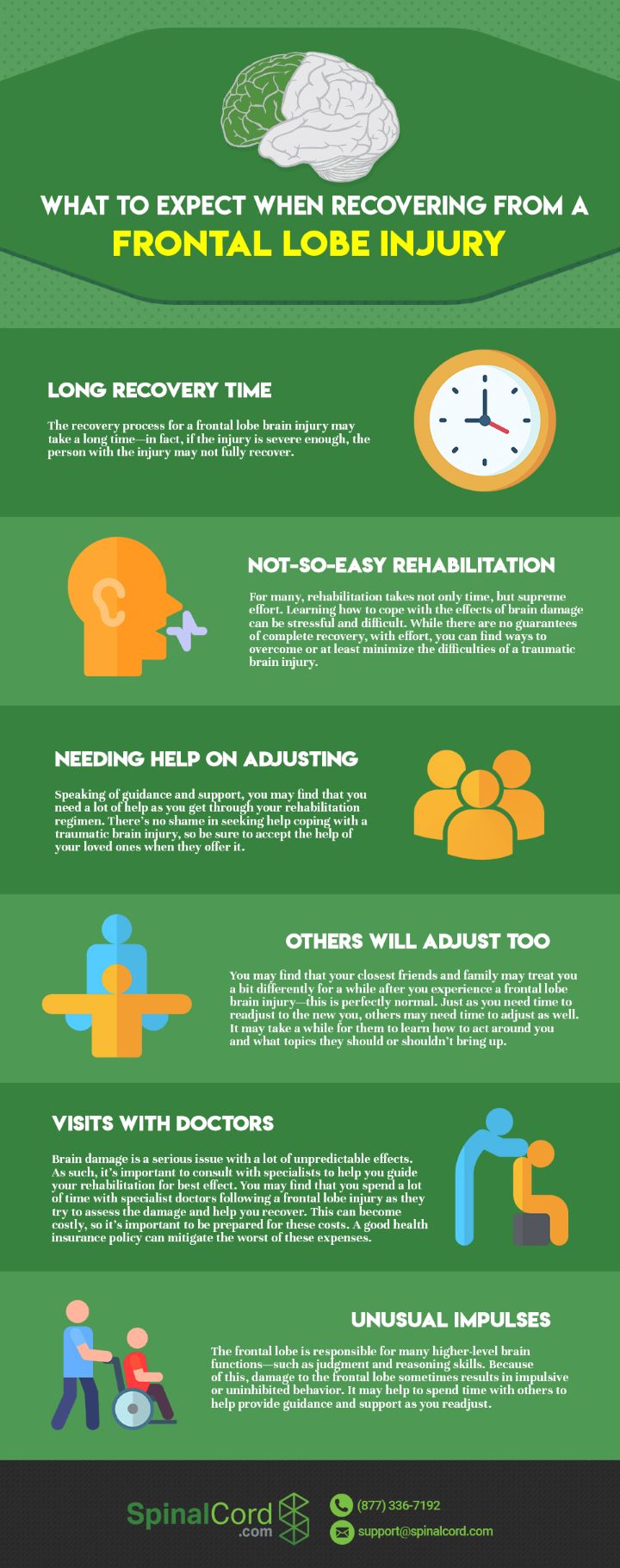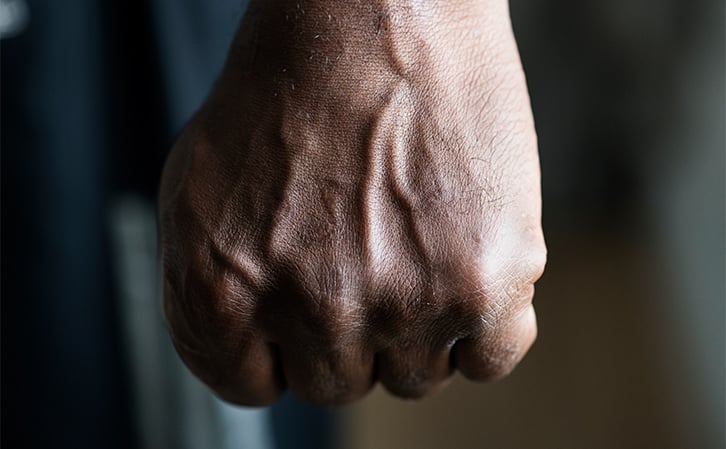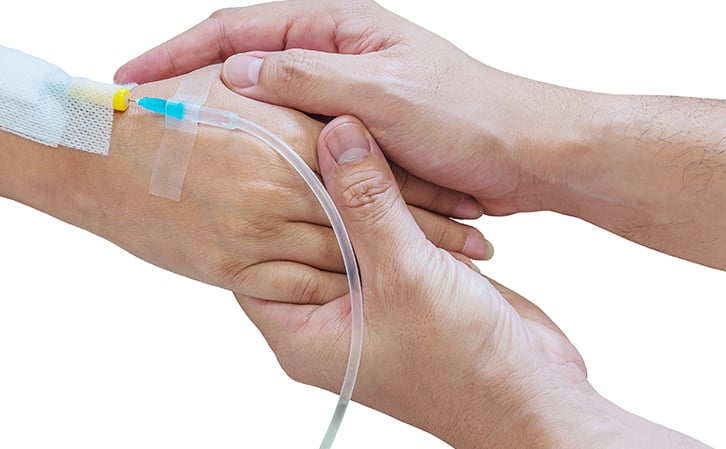What to Expect When Recovering from Frontal Lobe Damage
Brain injuries of any kind can be frightening to deal with, whether it’s you or a loved one who has suffered such injury. It can be hard to adjust to life following a traumatic injury, but there are ways to cope—and knowing what to expect from such injuries can help make the coping process easier on everyone.
For this article, let’s focus on what you can expect when recovering from a frontal lobe brain injury.
What Does the Frontal Lobe of the Brain Do?
The brain is divided into several lobes, including the:
- Frontal;
- Parietal;
- Occipital; and
- Limbic lobes.
Each of these lobes are responsible for different functions, and surround the insular cortex. The frontal lobe controls many different functions, such as coordination of movement, intelligence/reasoning, language, personality, as well as the expression and regulation of emotions.
The frontal lobe of the brain plays an enormous part in the higher functions of your brain that make you, well, you. However, it doesn’t achieve all of this on its own. The frontal lobe has many interconnections with the other lobes of the brain—most notably the limbic node.

What Are the Effects of Frontal Lobe Damage?
The effects of damage to the frontal lobe can vary greatly depending on the extent of the injury, which area of the lobe is affected, if/when treatment was received, and even the age of the person at the time of the injury.
Why is age a major factor in the effects that frontal lobe injuries have? The reason is that this lobe is the last brain region to achieve full development, and as such is highly susceptible to developmental anomalies arising from physical injury, infection, drug abuse, lack of stimulus, etc. before the mid-20s. Damage occurring during this time can result in permanent developmental disabilities.

Some of the common effects of damage to the frontal lobe include, but are not limited to:
- Sudden changes in behavior, including aggression;
- Impaired moral judgment;
- Memory loss;
- Reduced motor skills and spatial reasoning;
- Declining intelligence;
- Inability to understand/interpret social cues;
- Dementia;
- Impaired language skills;
- Loss of empathic reasoning (ability to relate to the emotions of others); and
- A range of specific syndromes.
Once again, the presence and severity of these symptoms of frontal lobe brain damage can vary depending on the nature/timing of the injury and treatment received. Even a “minor” injury could have far-reaching effects, which is why it’s important to seek treatment for any head injury that could damage the brain.
What Can I Expect When Recovering from a Frontal Lobe Brain Injury?

1. Recovery May Take a Long Time.
The recovery process for a frontal lobe brain injury may take a long time—in fact, if the injury is severe enough, the person with the injury may not fully recover.
2. Rehabilitation May Not Be Easy.
For many, rehabilitation takes not only time, but supreme effort. Learning how to cope with the effects of brain damage can be stressful and difficult. While there are no guarantees of complete recovery, with effort, you can find ways to overcome or at least minimize the difficulties of a traumatic brain injury.
3. You May Experience Unusual Impulses.
The frontal lobe is responsible for many higher-level brain functions—such as judgment and reasoning skills. Because of this, damage to the frontal lobe sometimes results in impulsive or uninhibited behavior. It may help to spend time with others to help provide guidance and support as you readjust.
4. You’ll Probably Need Help Adjusting.
Speaking of guidance and support, you may find that you need a lot of help as you get through your rehabilitation regimen. There’s no shame in seeking help coping with a traumatic brain injury, so be sure to accept the help of your loved ones when they offer it.
5. Others May Need Time to Adjust Too.
You may find that your closest friends and family may treat you a bit differently for a while after you experience a frontal lobe brain injury—this is perfectly normal. Just as you need time to readjust to the new you, others may need time to adjust as well. It may take a while for them to learn how to act around you and what topics they should or shouldn’t bring up.
6. Lots of Visits with Specialized Doctors.
Brain damage is a serious issue with a lot of unpredictable effects. As such, it’s important to consult with specialists to help you guide your rehabilitation for best effect. You may find that you spend a lot of time with specialist doctors following a frontal lobe injury as they try to assess the damage and help you recover. This can become costly, so it’s important to be prepared for these costs. A good health insurance policy can mitigate the worst of these expenses.
7. Bills.
Unfortunately, the world doesn’t stop because of a traumatic brain injury. Many who suffer such injuries may end up missing important bills, such as their mortgage, student loans, or car payments. You, or your caretaker, may have to contact your bank and the different companies you have debt with to negotiate payment delays, or even file for bankruptcy.
Get Support for Recovering from Frontal Lobe Damage
If a loved one suffers a frontal lobe injury, you can expect a lot of things about them to be different. For example, they may be more impulsive or moody. However, the important thing is to be there for them when you can and provide support, both physically and emotionally.
Things may not be the same after a loved one suffers traumatic brain injury, but by being there for them, you can make their ordeal just a little bit more bearable.
Frontal lobe brain injuries can be incredibly scary for both those who suffer them and their loved ones. However, no one should have to face such struggles alone.
Thankfully, there are support groups and organizations dedicated to helping those with frontal lobe brain injuries learn to cope with the side effects, such as the Brain Injury Association of America (BIAA), and many others.
These organizations often have great resources to help those suffering from frontal lobe and other kinds of brain and spine injuries overcome their challenges and lead fulfilling and productive lives again.
Need more info on brain and spine injuries? Check out some of our other resources today, or contact us by phone (877) 336-7192 or click on the Live Chat button at the top of the screen!
Sources:
- Frontal Lobes, Centre for Neuro Skills, https://www.neuroskills.com/brain-injury/frontal-lobes/
- Pirau, Letitia and Lui, Forshing, Frontal Lobe Syndrome, https://www.ncbi.nlm.nih.gov/books/NBK532981/
- What Does Damage to the Frontal Lobes Look Like 30 Years Post-Brain Injury?, Brainline, https://www.youtube.com/watch?v=bZHaSeYrb3M
- Frontal Lobe Brain Injury Recovery + Treatment, FlintRehab, https://www.flintrehab.com/2019/frontal-lobe-brain-injury-recovery/
Stay Updated on Advancements On Traumatic Brain &
Spinal Cord Injuries
About the Author





